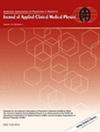Professionalism skills education in medical physics residency: Current state and perceived importance
Abstract
Purpose
The purpose of this study was to collect data on current practices for teaching and assessing professionalism in CAMPEP-accredited residency programs.
Methods
A survey of 21 questions was sent to 160 program directors (PDs) of CAMPEP-accredited residency programs. A list of professionalism skills was compiled from the AAPM MPLA curriculum: (a) Personal and interpersonal, (b) professional and developmental, and (c) executive and administrative. The survey collected information on: (1) residency program respondent demographics, (2) essential professionalism skills and training methods, (3) confidence and satisfaction in teaching professionalism, (4) assessment of professionalism, (5) barriers and desired resources, (6) training of PD and staff in professionalism, and (7) free response. Descriptive statistics and thematic analyses were used to evaluate the collected data.
Results
A total of 97 respondents completed the survey (therapy = 75, diagnostic = 22) with a 61% response rate. 16 out of 24 professionalism skills were deemed essential for trainees to develop during residency training. While 92% teach professionalism, only 51% reported confidence in teaching these skills. The ABR/ACR/RSNA/AAPM/ASTRO/ARR/ARS online modules are used by 87% but only 31% indicated that the modules are sufficient. Only 10% use a structured method for assessment. The majority (59%) assess professionalism in an ad-hoc manner and 22% only assess when problems arise. 44% reported facing barriers to implementing a professionalism curriculum. The main barriers for developing a professionalism curriculum included: lack of time (39%), resources (32%), or expertise (26%). 79% reported that case studies were the most desired resource. 47% of respondents indicated receiving formal professionalism training.
Conclusions
There is a strong need and desire for structured professionalism training in residency programs. This study presents a consensus understanding of the professionalism skills that are deemed essential and teachable during residency and has identified areas for improvement in teaching, assessing, and developing curricula.


 求助内容:
求助内容: 应助结果提醒方式:
应助结果提醒方式:


